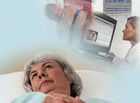Sleep and Aging
Diagnosing Sleep Disorders
If You Don't Sleep Well
If you are often tired during the day and don't feel that you sleep well, you should discuss this with your doctor or healthcare provider. Many primary care providers can diagnose sleep disorders and offer suggestions and treatments that can improve your sleep.
Keep a Sleep Diary
Before you visit the doctor, it may be very helpful for you to ask for and keep a sleep diary for a week or more. A sleep diary will give you and your doctor a picture of your sleep habits and schedules and help determine whether they may be affecting your sleep.
What to Share With Your Doctor
During your appointment your doctor will ask you about your symptoms and may have you fill out questionnaires that measure the severity of your sleep problem. It is also helpful to have your bed partner come with you to your appointment since he or she may be able to report symptoms unknown to you like loud snoring, breathing pauses, or movements during sleep.
Since older people are more likely to take medications and to have medical problems that may affect sleep, it is important for your doctor to be aware of any health condition or medication you are taking. Don't forget to mention over-the-counter medications, coffee or caffeine use, and alcohol since these also may have an impact on your sleep.
What Your Doctor Will Look For
The doctor will then perform a physical examination. During the exam the doctor will look for signs of other diseases that may affect sleep, such as Parkinson's disease, stroke, heart disease, or obesity. If your doctor feels more information is needed, he or she may refer you to a sleep center for more testing.
Sleep Tests
Sleep centers employ physicians and others who are experts in problems that affect sleep. If the sleep specialist needs more information, he or she may ask you to undergo an overnight sleep study, also called a polysomnogram, and/or a daytime sleepiness, or a nap test. A polysomnogram is a test that measures brain waves, heart rate, breathing patterns and body movements.
A common sleepiness test is the multiple sleep latency test. During this test, the person has an opportunity to nap every two hours during the daytime. If the person falls asleep too quickly it may mean that he or she has too much daytime sleepiness.




